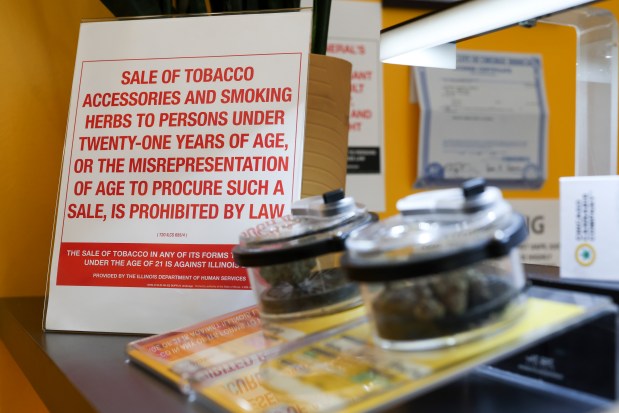A new report on hemp-derived THC highlights growing concerns over its safety, legality and impact on health — even as Illinois lawmakers have failed again to keep the products away from children.
The report by the University of Illinois System Institute of Government and Public Affairs notes that the lack of regulation of hemp means there is no state oversight of ingredients, potency or marketing to kids.
The report cites studies showing many hemp products had different amounts of THC than labeled, while some were well above the package limits for licensed cannabis products, and contained toxic solvents left over from processing.
Some products also mimicked popular candy or snack packaging that could appeal to kids. Several incidents have occurred in the Chicago area of school-age children going to hospitals after ingesting hemp products.
But as in previous years, state lawmakers failed to take any significant action on hemp in its latest session, which ended Saturday.
Hemp is caught in a Catch-22 repeating cycle of inaction. The 2018 federal Farm Bill legalized hemp, defined as cannabis plants that have less than 0.3% by weight of Delta-9 THC, the primary component of the plant that gets users high. Although the Farm Bill allowed production of non-intoxicating hemp derivatives such as CBD, it also inadvertantly set off an explosion of intoxicating products now available across the nation at smoke shops and gas stations.
Hemp processors found ways to use chemical solvents or other methods to produce variants such as Delta-8, Delta-10, and THCO, which can get users high like marijuana. And with little enforcement, many hemp products contain Delta-9 THC anyway. The federal law also set no age restriction for hemp products.
While cannabis, which is the same plant but with high levels of Delta-9, remains federally illegal, it’s legal for recreational use in Illinois and 23 other states. But getting a business license is extremely difficult and expensive, and regulations make it much more expensive to open and run a cannabis business than a hemp shop.
As a result, hemp shops have proliferated, while many who hold cannabis business licenses have failed to get up and running. Cannabis industry leaders want to shut down their competition, saying unlicensed hemp undercuts those who went through arduous cannabis licensing.
Hemp business owners say they want to be regulated instead. Proposed hemp legislation set guidelines that would have been similar to those on cannabis businesses: sales only to those 21 and over, and testing and labeling of products for potency and contaminants, but without the expensive licensing.
The chief proponent of allowing hemp businesses to operate with further regulations in Springfield, Rep. La Shawn Ford, said lawmakers could not reach agreement over whether to ban or regulate hemp. But since the spring legislative session ended, Ford has had joint meetings with cannabis and hemp operators in an attempt to reach some compromise.
With the lack of licensing and taxation for hemp, and continued problems for cannabis, the state is losing out on millions in potential tax revenue, Ford said. “It’s always been industry against industry, so now everyone has made a commitment to work together to regulate hemp and make some improvements to cannabis,” he said.
At least 14 states have made intoxicating hemp products illegal, and numerous municipalities in Illinois have done so.
Despite Gov. JB Pritzker calling last year for hemp restrictions, state lawmakers have been stuck between the two sides, unable to reach a consensus, and as a result have done nothing. Both cannabis and hemp businesses have made significant campaign contributions to legislators.
Rachel Berry, president of the Illinois Hemp Growers Association, said the lack of legislation allows business to continue as usual, but again misses an opportunity for “common-sense” regulation.
“It seems like there’s been a lack of leadership amongst lawmakers to get this issue taken care of,” she said. “This is something that the community has been asking for for years.”
She also took issue with the hemp study’s characterization of intoxicating hemp as a “loophole” in the law. She noted that federal law explicitly allows for “all derivatives, extracts, cannabinoids, isomers, acids, salts, and salts of isomers” from hemp, which opened the door to Delta-8 and other intoxicating products.
From the other side of the issue, the Cannabis Business Association of Illinois argues that intoxicating hemp products are flooding the market, undercutting licensed operators, evading health and safety regulations, and generating minimal state revenue because they aren’t taxed at the high rate applied to licensed cannabis.
“Hemp and cannabis come from the same plant,” association Executive Director Tiffany Chappell Ingram said. “Both products can get users high. It’s time Illinois regulate intoxicating hemp in a manner similar to cannabis.”

The National Poison Center reported about 5,000 cases of Delta-8, Delta-10 or THC-O acetate accidental or abusive ingestion, representing an 89% increase from 2021 to 2022. A 2022 national survey found that 10% of Illinois youths age 12 to 17 had used a hemp product in the past year.
The University of Illinois hemp study concluded that producers would likely find new ways to get around a ban on intoxicating hemp products, which could merely drive customers online. Instead, requiring limits on hemp packaging amounts, and testing hemp products for potency, accuracy in labeling, and contaminants “could best serve the public interest.”
Tomasz Gliszewski, founder of Chicago Cannabis Co., which sells hemp products, has grown to three stores on the city’s North Side since 2018, said lawmakers should approve a 21 and older age limit for hemp, with a 3% sales tax. Responsible hemp store operators already restrict sales to adults, he said, and sell tested products.
His stores are described as “Your neighborhood weed shop.” The company offers joints, vapes and edibles with THC or CBD, available by online ordering and same-day home delivery via DoorDash — something state-licensed cannabis companies can’t do.
“It’s been rough not having clarity,” Gliszewski said. “Instead of trying to ban this stuff, they should pass common-sense legislation.”
More companies are moving into the hemp business. Even Edible Brands, the parent company that makes Edible Arrangements fruit bouquets, has entered the market, with hemp-derived THC-infused products at edibles.com.
Meanwhile, lawmakers took no major action to help struggling state-licensed cannabis businesses and their customers. A bill that would have expanded medical marijuana to all dispensaries, lowered licensing fees and allowed curbside pickup and drive-thru windows died again in Springfield this session.



